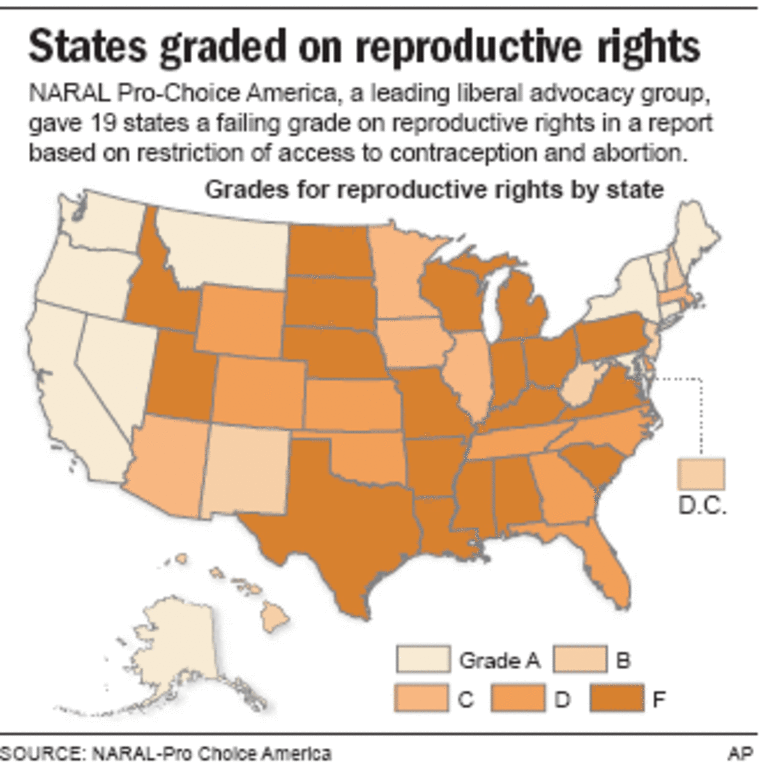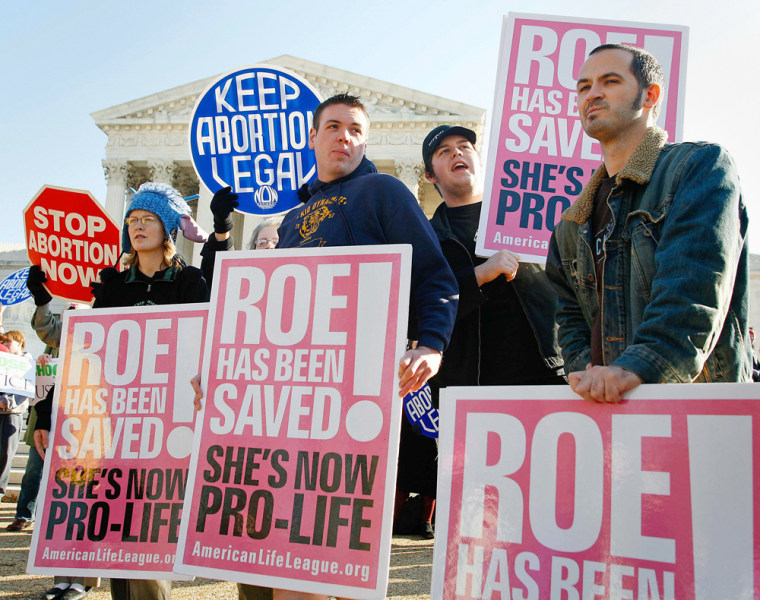While the national abortion debate is now focused on the Supreme Court, both sides expect crucial battles to unfold this year on the state level.
Lawmakers in two states are proposing broad abortion bans they hope will eventually win approval from a reconfigured, more conservative high court. Legislators elsewhere are seeking to tighten a range of abortion restrictions; one leading liberal advocacy group gave 19 states a failing grade on reproductive rights in a national status report issued Wednesday.
“It’s a picking away at our freedom and privacy, legislature by legislature, law by law, with the ultimate goal of overturning Roe v. Wade,” said Nancy Keenan, president of NARAL Pro-Choice America.
Among the states getting F’s in NARAL’s report are Indiana and Ohio, where conservative lawmakers are introducing bills to ban abortion outright. They hope their measures become law and then face legal challenges that lead to a Supreme Court reconsideration of the 1973 Roe ruling that established abortion rights nationwide.
“It is time to return the abortion issue to the states,” said Mark Harrington, executive director of the Center for Bio Ethical Reform Midwest and a supporter of the proposed Ohio ban.
Alito expected to vote pro-life
NARAL and its allies believe Samuel Alito, expected to win confirmation to the Supreme Court later this month, would represent a fourth vote on the nine-member court against Roe — putting the ruling in jeopardy if one of the five supporting justices was replaced by an opponent.

It remains unclear how far the proposed Indiana or Ohio bans will progress. Indiana Gov. Mitch Daniels — a Republican who opposes abortion — suggested that the ban has “a very limited prospect of ultimate success” until Americans become less divided on abortion.
Mary Spaulding Balch, director of state legislation for the National Right to Life Committee, said she is cautiously optimistic that the new Supreme Court — with two justices appointed by President Bush — will be more favorable to abortion restrictions even if reversal of Roe is not imminent.
“We would hope there will be incremental gains that will take us closer and closer to the point where the unborn child will be protected,” she said. “How fast or slow that will be, I don’t know.”
According to the NARAL report, state legislatures enacted 58 measures in 2005 that restricted access to abortion, double the number in 2004.
Anti-abortion activists “are using the states as laboratories,” Keenan said. “They are emboldened by an anti-choice president, an anti-choice Congress and anti-choice appointments to the courts.”
New aspects of abortion included in proposals
Measures enacted last year or under consideration this year include counseling requirements or waiting periods before women can have an abortion, tightening of parental involvement laws, and extra layers of regulations for abortion clinics. A bill endorsed Wednesday by an Arizona legislative committee would require doctors to tell women seeking abortions that their fetuses could experience pain even if the women receive pain medication.
Though worried by the surge of such restrictive laws, Keenan said she was heartened that many states were passing “pro-choice” laws to ensure that women have access to emergency contraception and that require health insurance companies to cover birth control.
She noted that even some conservative-leaning “red states” — such as Montana and Nevada — had won high grades from NARAL for their overall approach to reproductive rights.
“The issue there is about the right to privacy, it’s about freedom,” she said. “It’s about keeping the government out of our most private decisions.”
The 11 states receiving A’s from NARAL were Alaska, California, Connecticut, Maine, Maryland, Montana, Nevada, New York, Oregon, Vermont and Washington.
States receiving F’s on abortion rights
Those getting F’s were Alabama, Arkansas, Idaho, Indiana, Kentucky, Louisiana, Michigan, Mississippi, Missouri, Nebraska, North Dakota, Ohio, Pennsylvania, South Carolina, South Dakota, Texas, Utah, Virginia and Wisconsin. NARAL predicts that most of these states, and probably some others, would ban abortions if Roe were overturned.
NARAL issued its report the same day that the Supreme Court decided to send a hotly debated parental notification law from New Hampshire back to a lower court to reconsider whether the notification requirement should be waived if a pregnant girl’s health were at stake.
Keenan said the case “is an example of how lawmakers at the state and federal levels are continuing to exploit every opportunity to take away our reproductive freedom even while Roe v. Wade stands.”
